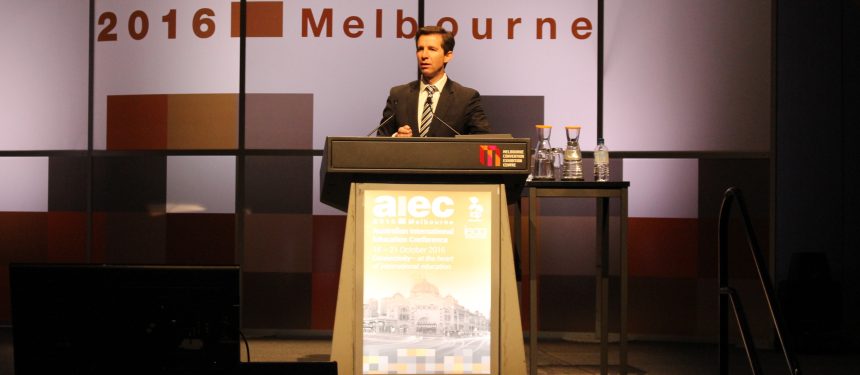Consultation will begin on a revised Australian national code of practice for international educators, which will take into account international students changing courses, according to a recent letter from the Minister for Education and Training.
News and business analysis for Professionals in International Education
Have some pie!
Minister responds to Aus course hopping concerns
 Minister Simon Birmingham speaking at the Australian International Education Conference earlier this year. Photo: The PIE News
Minister Simon Birmingham speaking at the Australian International Education Conference earlier this year. Photo: The PIE News Writing to the Association of Australian Education Representatives in India, Minister Simon Birmingham said the National Code of Practice for Providers of Education and Training to Overseas Student 2007 will be looked at as part of the overall Education Services for Overseas Students framework reforms.
He will also consider concerns raised about the impact of students who “course hop” on the international education industry in Australia.
“Formal public consultation on a revised National Code is expected early next year”
Course hopping has been a topic of worry in the industry for some time, the process where students are encouraged to transfer from one institution to another by unscrupulous agents once they arrive onshore, circumventing visa regulations.
“Formal public consultation on a revised National Code is expected early next year,” Birmingham wrote in the letter. “And all stakeholder views will be considered in the process.”
The letter is in response to a petition filed by AAERI calling for a ban on the onshore representation fee to agents and safeguarding the Australian education industry.
The petition cites reports that Part D, Standard 7 may be amended, which “would make it easier for onshore students to move students without waiting for six months of the principal programme”.
Course hopping not only has a negative impact on serious Australian education providers’ financial returns, says AAERI’s petition, but these providers “are losing their reputations and income as a result of non-genuine student actions for which they have no control”.
“Technically, a commission to an offshore agent is paid not only for marketing but also to help the student in applying for [a] visa,” it continues. “Plus the offshore agent does the due diligence for meeting the Genuine Temporary [Entrant] requirements.”
On the other hand, onshore agents “encourage the student to change the education provider and has no role when it comes to visa application or due diligence”, according to the petition.
In response to these concerns, Birmingham replied: “I will give serious consideration to your concerns that any change to the current restriction on students transferring within the first six months of their principal course may adversely impact the Australian international education sector.”
Still looking? Find by category:


